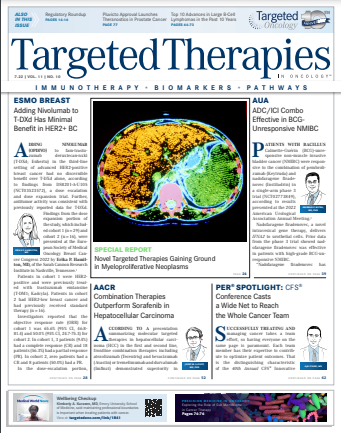Promising Findings From DESTINY-Breast04 Trial Energizes ASCO Meeting
Harnessing existing and otherwise safe antibody-targeting strategies and combining them with chemotherapy or other bioactive compounds or as a bispecific dual antibody moiety are an exciting strategy of protein engineering that is emerging and coming into its own in oncology.
Robert L. Ferris, MD, PhD

If you haven't heard or were not at the 2022 American Society of Clinical Oncology (ASCO) Annual Meeting, very exciting findings emerged during the plenary session focusing on the results of the DESTINY-Breast04 trial (NCT03734029). This study evaluated the use of an antibody-drug conjugate (ADC), fam-trastuzumab deruxtecan-nxki (Enhertu), with a chemotherapy payload attached to the HER2 antibody targeting breast cancer with low expression of HER2. The results for progression-free survival and significantly improved overall survival in patients with low HER2 expression, regardless of hormonereceptor status, compared with standard chemotherapy were exciting.
As a phase 3 trial targeting a previously unaddressed population of patients, this was one of those ASCO meetings that truly energized the field. Initially, trastuzumab was only useful for that fraction of patients with high HER2 expression. Now using this ADC therapy, those patients with low expression are candidates for an exciting and effective new oncologic therapy.
Secondly, a number of patients may express HER2 but not at the high levels seen in a subset of breast cancer patients. Thus, these other solid tumors may now have a new therapy available, including urologic and lung cancers and some types of head and neck and salivary cancers, with ongoing trials currently accruing. Furthermore, the concept of the ADC may not only overcome resistance when the protein is present at high levels, but the payload of chemotherapy may provide an amplification and multiplier effect to the tumor antigen–targeted therapeutic antibody itself.
Harnessing existing and otherwise safe antibody-targeting strategies and combining them with chemotherapy or other bioactive compounds or as a bispecific dual antibody moiety are an exciting strategy of protein engineering that is emerging and coming into its own in oncology. Although we certainly do need to monitor for unexpected or similarly amplified toxicities, let us not forget that part of the excitement of the plenary session and the DESTINY-Breast04 success was that it was collectively shared and experienced at ASCO. The energizing effect for the trainees and the experienced clinical investigators was palpable. It also teaches us that trials do work and do change practice. It pays to offer clinical trials to our patients and slog through the sometimes-tedious work of developing a protocol, getting it funded, and carrying it to fruition. Thus, it was a great experience to be present again at ASCO in the plenary session. Here’s to many more experiences together with such exciting and positive data benefitting our patients.

Survivorship Care Promotes Evidence-Based Approaches for Quality of Life and Beyond
March 21st 2025Frank J. Penedo, PhD, explains the challenges of survivorship care for patients with cancer and how he implements programs to support patients’ emotional, physical, and practical needs.
Read More